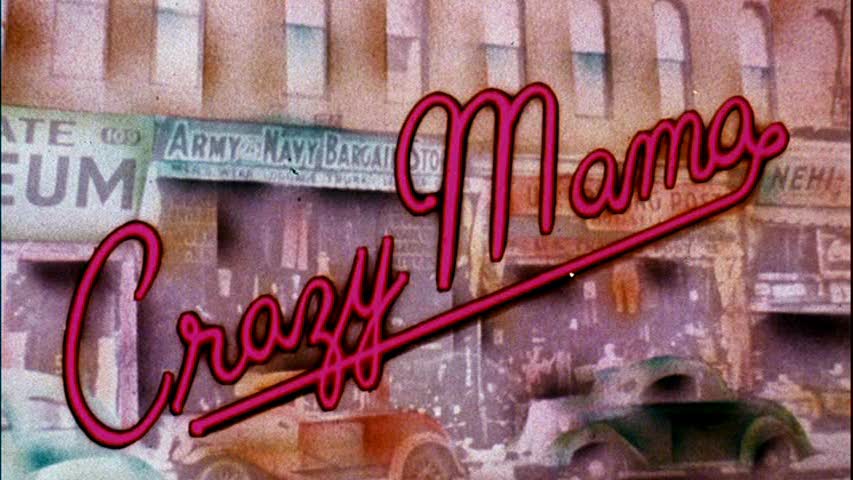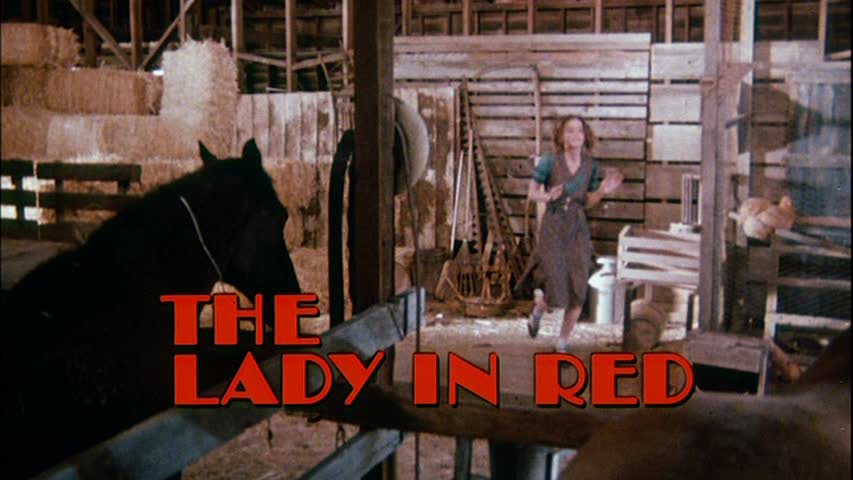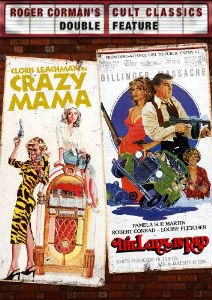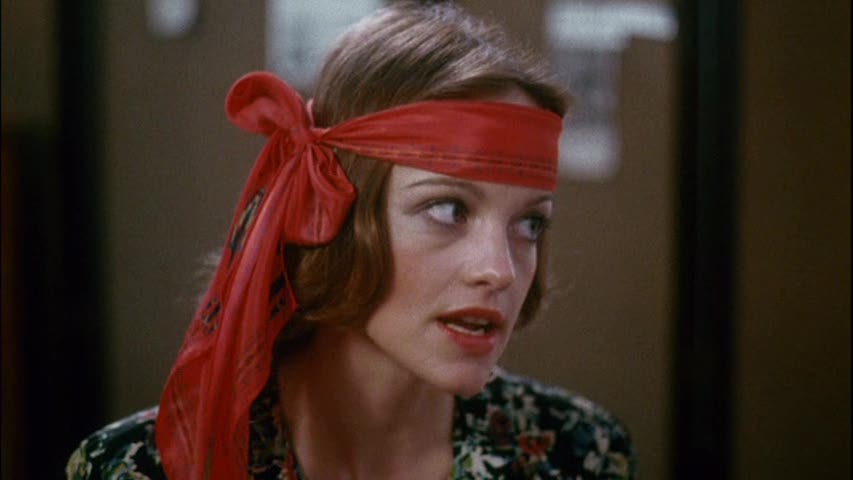

 BUY FROM AMAZON: CLICK HERE!
BUY FROM AMAZON: CLICK HERE!
STUDIO: Shout! Factory
MSRP: $19.93
RATED: R
RUNNING TIME: 174 Minutes
SPECIAL FEATURES:
- Audio commentary with director Jonathan Demme and Roger Corman
- Interview with director Jonathan Demme and Roger Corman
- Theatrical trailer and TV spots
- Audio commentary with director Lewis Teague and actor Robert Forster
- Audio commentary with producer Julie Corman and screenwriter John Sayles
- Theatrical trailers
- Poster gallery
- Additional trailers
The Pitch
Double your pleasure with booze, broads, and bullets Corman style!
The Humans
Crazy Mama
Director: Jonathan Demme
Writer: Robert Thom
Cast: Cloris Leachman, Stuart Whitman, Ann Sothern, and Linda Purl.
The Lady In Red
Director: Lewis Teague
Writer: John Sayles
Cast: Pamela Sue Martin, Robert Conrad, Louise Fletcher, and Christopher Lloyd.

POST-COITAL CIGARETTE 150 MILES
The Nutshell
Two tales of girls packing guns and guys, neither of which they’re afraid to use. The first, a gonzo road movie that comes on like The Beverly Hillbillies meets Badlands. The second, a picaresque yarn set against the backdrop of a Dillinger obsessed 30’s Chicago.
The Lowdown
There are two kinds of kids. The first watch The Lion King in the assembly hall on the last day of term, giggling at the crying girls when Mufasa dies. The rest go to the local video shop after school every day even if they don’t have any money or a friend/family member to beg for something. They go just to look at the covers. Admiring those pulpy old paintings of spacemen from Planet 10 and the women they loved or maybe just a man-in-suit or two is its own fix for them. If you were that sort of kid as well, chances are you developed a certain kind of taste. Bi-polar, you might say. There’s a place in your heart for summer tent-poles and awards-bait, yet nothing grabs you quite like a bit o’shlock. In literary theory, they call this the Other (note the capital “o.”) In pictures they call it simply “B.” These “exploitation” films which dance on the very edge of respectability hook us in away mainstream movies never could. A lot of this is due to their honesty. We’ve all walked out of a movie and heard someone complaining it “wasn’t what I expected”, or “it didn’t have enough action.” Have you ever heard anyone demand their money back because the robots weren’t clanky enough in Clank Clank, You’re Dead? Didn’t think so. That’s because Clank Clank, You’re Dead and its cinematic brethren know better than to disappoint. They set their targets and ravish them like so many green-skinned alien women on far away worlds.
A constant stream of rebellious babes and ultra-violence never hurt either… whatever the genre.

"I don't tell ya how to wear your hats, mistah. Don't tell me how to wear mine."
Before he silenced lambs with Jodie Foster, Jonathan Demme directed 1975’s Crazy Mama, a cash-in on exploitation legend Roger Corman’s previous “woman gangster film”, Big Bad Mama. On the surface, it’s the simple tale of three womens’ struggle to reclaim their former Arkansas home after their Californian beauty parlour is repossessed. Even by the most madcap road movie standards, Crazy Mama is irresistibly zany. When things don’t go their way, Sheba Stokes (Sothern) her daughter Melba (Leachman) and granddaughter Cheryl (Purl) swindle their way around it somehow. If a problem comes along that can’t be conned or robbed, they blast their way through it. Or marry someone who can shoot it for them. Nothing will stand between them and their quest to “reclaim” the farmland taken from them by The Man some 30 years since, least of all the most rudimentary concept of right and wrong.
Cloris Leachman (Young Frankenstein) relishes Melba’s every come-on and helpless shriek, crafting a believably conflicted woman in the process. She’s the victim of a tragically naive upbringing. Brainwashed by her mother – Ann Sothern’s brazen Sheba – Melba passes on the “get rich or die trying” message to Cheryl. As the gang sets out on its adventure, Melba learns Cheryl is pregnant by local surfer Shawn (Happy Days‘ Donn Most.) “You ruined my baby’s life” Melba screams. The irony of this woman then taking said daughter along on a hopeless crime-spree and turning the father of her underage daughter’s baby into a patsy is so grand it must be visible from space. Fortunately Demme doesn’t beat us around the head with the gang’s (im)morality, instead allowing the sugar rush of their adventure to cool off like the onset of guilt after an eating binge. The Stokes’ carousel of crime and carnality, like all rides, can only go so far. Half the joy of Crazy Mama, like the build up to a first horror movie kill, is wondering when the inevitable payoff will come. And how much collateral damage there’ll be.

"I don't care if it's canonical. I'm directing this 'Street Fighter' remake and my Ryu is a chick."
Bright and breezy definitely suits the morally bankrupt shenanigans of Crazy Mama, so surely the same thing goes for guys and dolls, right? Circa 30’s Chicago is, indeed, the perfect backdrop for gunfights, car chases, and explosions, but that’s not all The Lady In Red has up its stockings. If Quentin Tarantino hopped back to the Capone era in a time machine, got stoned while reading Moll Flanders and fell asleep at his typewriter, the end result wouldn’t be far off this 1979 offering. Starry-eyed Polly Franklin (Rachel McAdams look-alike Pamela Sue Martin) gets sick of Daddy’s knuckle sandwiches and runs off to the big city where she sleeps her way up and down society’s ladder. Polly soon winds up working as a hooker for Anna Sage (Deep Space Nine‘s Louise Fletcher sporting a truly Russian Romanian accent) wherein she becomes embroiled with Christopher Lloyd’s mobster Frognose. Oh, and John Dillinger (Robert Conrad.) There’s even time for a mini “women in prison” movie thanks to Polly and her friend Rose’s (Laurie Heineman) nightmarish jail sub-plot.
Although Lady has its fair share of household names who turn in fine performances, it’s the likes of Glenn Withrow’s wannabe wiseguy Eddie or Peter Hobbs’ seasoned crook Pops who steal hearts as well as the loot. Genre veteran Dick Miller – who also appears in Crazy Mama as a clumsy sheriff’s deputy – shines as Lady‘s sweatshop tyrant Patek. John Sayles’ (Battle Beyond The Stars) romantic script is blessed with a host of memorable characters ranging from crooked cops to affable mobsters, but Tiny Alice’s (Nancy Anne Parsons) ruthless prison warden edges it by a nose. Dial her co-star Louise Fletcher’s Nurse Ratched from One Flew Over The Cuckoo’s Nest up a few crazy notches and you’re on the right track. Director Lewis Teague (Navy Seals) handles the film’s multi-faceted tone well, allowing a tragic abortion scene and O.T.T. villain such as Alice to co-exist. While some antagonists shy away from getting their own hands dirty, Alice takes particular pleasure in laying down the law personally. Her bloody fight with Polly against the cell bars is a firm reminder that the only balls you need to be The Man are figurative. For all these films’ quasi-feminist bravado (both feature mobs of women tackling oppressive male authority figures) they’re not nearly as deluded as some of their subjects. There’s no cartoon gender morality line here. Looking out for your friends is all well and good, but, as both films show, there comes a time when everyone looks out for number one.

"Nega-Doc" brought mind-control to creepy new places.
Crazy Mama may be loaded with crash bang wallop goofiness, but the emerging talent behind the camera is plain to see. Jonathan Demme doesn’t so much hold a warped mirror to reality as he does have fun with the fairytale idea of the “American Dream.” Melba’s overnight husband, Texan Mayor Jim Bob (Stuart Whitman), seems like the missing ingredient in their crew, but it soon becomes clear these petty crooks aren’t cut out for the big-time, resulting in some fine car crash viewing… literally. The gang stumble their way from California to Arkansas, just barely scraping out of their every two-bit heist and swindle. The further they run from the law, the further down a metaphorical road to Hell they go (stealing money from a Vegas wedding chapel being a particular low-point.) Ideas above its station are the last thing a demented action comedy with a rockin’ 50’s soundtrack needs, though. Wry Biblical references – the Stokes hail from Jerusalem, Arkansas – and Sheba’s insistence that their revolving gang of swindlers are morally sound because they’re taking back what’s theirs hint at heavier terrain. However, Demme doesn’t lose sight of the fun. Everybody wins.

"Is it just me, or is this Bob Dylan video a little strange?"
Given Crazy Mama‘s relationship to Big Bad Mama, some may wonder why it was paired with The Lady In Red for this release instead of its spiritual predecessor. When viewed in tandem though, the wider similarities between them become more apparent. Both films show how far ordinary people will go to survive under duress. The Stokes’ and their band of reprobates see the world through deluded eyes. Theirs is an America built on slick advertising slogans (which Jonathan Demme dots throughout their road trip in the form of passing signs), consumer gullibility, and “gimme gimme gimme” juvenile greed. If they see something they want, why shouldn’t they just be able to reach out and take it? What could be more “American” than following a dream? And besides, a girl’s got to use any edge she can to make it in a big tough man’s world. In many ways, figures like Polly Franklin forged the romantic idea of dames who have their cake and eat it in minds like the Stokes’, so The Lady in Red and Crazy Mama are, in fact, a perfect combination. A before and after showing two generations of distinctly American femme fatales.
The Package
Glorious. Shout! Factory are a film enthusiast’s dream come true because they give left-field movies the respect they deserve. This disc’s presentation follows the excellent template established by the Roger Corman’s Cult Classics Series. Packaging both films as an old fashioned drive-in double feature, complete with ripped poster artwork, is a lovely touch; actually building a “grindhouse” feature into the disc allowing them to be viewed as an uninterrupted double-feature (right down to the bonus trailers) is nothing short of genius. Considering just how seldom this kind of touch is applied only makes it stand out all the more. Better still, the DVD menu is designed as a matching movie theatre. First, click to “buy” your ticket, then make your way into the “cinema” where you can go straight to the movies or treat yourself to a quick scene at the “concession stand.” Just don’t forget to sneak into the “projection room” tucked off to the side before you go. This disc’s special features are well worth the effort.
It’s not all poster galleries, trailers, and TV spots, though. The disc’s technical standards more than meet the mark as well. Every grindhouse scratch and cigarette burn has been beautifully preserved. Robust widescreen transfers give both films’ pulpy gloss all the vibrancy of a chalk pastel painting; the smoky yellow sun heats up the open road in front of the Stokes’ and clouds the murky underworld of alleys and whorehouses Molly frequents. Audio presentation is wonderful, too, with none of the quotable dialog (“what’s the good of being an outlaw if you look like an in-law?”) or period music getting lost in the mix. James Horner’s (Avatar) ominous piano bass and horn score especially gives every stick-up and car chase in Lady the juice it needs.
Crazy Mama gets an enjoyable commentary from Demme and Roger Corman. Both men readily poke fun at the film’s urgent 15 day shooting schedule and lack of budget. An additional interview with them makes a nice companion to the commentary. Touching on both mens’ careers and how their paths crossed (a young Demme calling Corman to ask about a job, basically), it’s a fascinating, albeit brief, look into the infamous “Roger Corman film school” set up of New World Pictures. Lewis Teague and Robert Forster’s commentary on The Lady In Red is hampered by prolonged spells of silence where both men get distracted by the film. Things even get a little awkward when Forster, who took an uncredited role as the hit-man Turk to keep a promise to the director, has to repeat himself when Teague isn’t listening. Still, it’s worth a go just for Teague’s revelation that the film’s influence on Quentin Tarantino is no coincidence; the Pulp Fiction director – who later cast Forster in Jackie Brown, of course – has a poster of The Lady In Red in his screening room. It certainly goes some way towards explaining one Shosanna Dreyfus’s choice of dress colour.
Producer Julie Corman and screenwriter John Sayles’ commentary, on the other hand, is one of the best I’ve ever heard. Sayles, a crime buff, sprinkles historical context on Chicago’s sordid past over the track. The benefits of Sayles’ Dillinger passion translate wonderfully onto the screen; unlike Michael Mann’s disappointing Public Enemies, The Lady In Red isn’t tethered to any realistic obligations. This is the legend behind the man as opposed to the man behind the legend. For a figure still so clouded in mystery, it’s the perfect cinematic treatment and the film’s gracefully aging grainy look is the ideal gift wrapping. This double feature turns the cops ‘n robbers genre into a hot rod which it then proceeds to set on fire and drive off a cliff. But it’s not the acrid smell of smoke that soon fills the air, it’s the rich, intoxicating aroma of danger. If you’re in need of some moxy, look no further. Capiche?
Rating: 




Out of a Possible 5 Stars